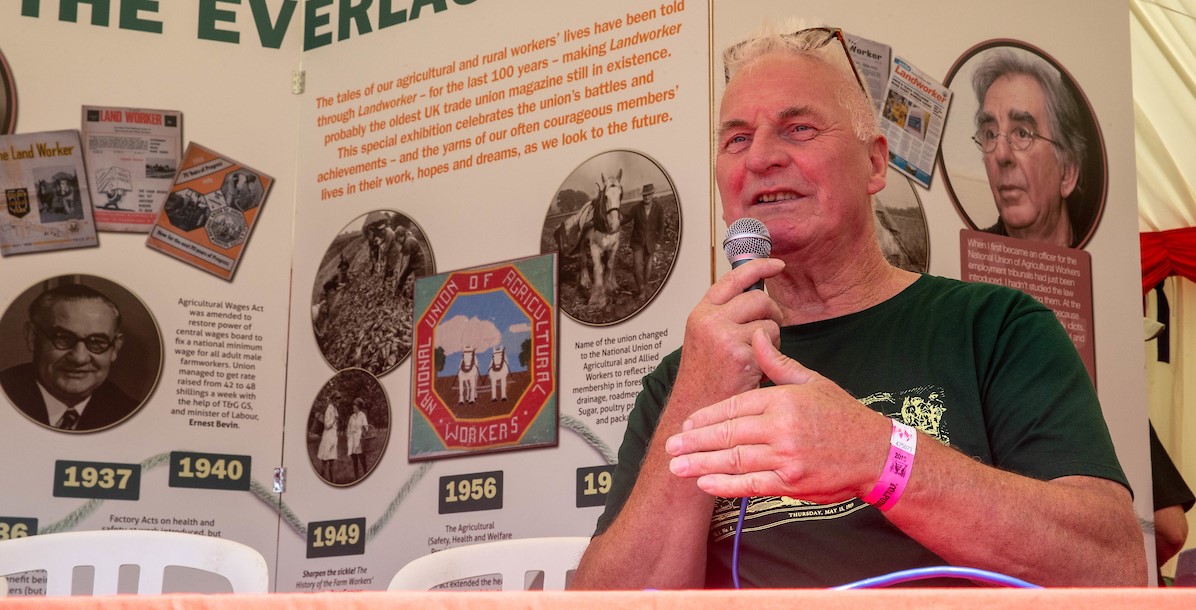â€Fearless, campaigning journalism’
Unite celebrated the 100th anniversary of the Landworker magazine – the oldest trade union publication still in circulation – at this year’s Tolpuddle Martyrs’ Festival in Dorset with a panel discussion that drew widespread acclaim from the union’s agricultural workers and beyond.
Organised and chaired by Landworker editor Amanda Campbell, the event was the only one at the Tolpuddle Festival whose focus was agriculture and the seminal importance of the Tolpuddle Martyrs – the forebears of the British trade union movement after whom the festival is named.
Eminent guest speakers including Labour’s shadow minister for agriculture and rural affairs David Drew MP and the former general secretary of the National Union of Agricultural Workers (NUAW) Barry Leathwood, among others, spoke on a range of issues – from engaging rural voters to the impact the Landworker magazine has had on generations of readers and more.
David Drew, Labour Co-operative MP for Stroud, highlighted the devastating impact a no deal Brexit would have on British agriculture – in particular animal welfare.
He recounted a discussion he had with British â€Red Lion’ egg producers whose quality standards are significantly higher than much of the rest of the world.
“I asked them what will happen if we sign a treaty with the United States,” he said. “And they replied, â€We won’t exist’. They will come in with their very cheap eggs which they will mass export to us with no animal welfare standards because there’s nothing you can do under WTO rules. Animal welfare is not something you can defend.”
Drew added that in the event of a no deal Brexit, “the UK’s self-sufficiency will decline, but more particularly we can wave goodbye to animal welfare standards and environmental protections”.
Responding to a question by Amanda Campbell about the privatisation of the Forestry Commission, Drew vowed that a Labour government would renationalise the Commission and pledged too that Labour would restore the Agricultural Wages Board (AWB) to reverse the race-to-the-bottom in farmworkers’ pay and conditions.
Landworker
Barry Leathwood, former leader of the NUAW and later a national secretary for the TGWU, heaped praise on the Landworker magazine, which he said has been a vital link between members and the union for generations.
Recalling when he used to read the Landworker as a young man, Leathwood said, “It was always there. It became part of my DNA. It was the major communication the union had with its members.”
Leathwood told of the days before check-off, when union officials went door-to-door to collect union subscriptions.
“When collecting their subs, they always gave something in return. And that something was the Landworker. It was extremely important because it was the handing over of something physical from one person to another – with articles, helpful suggestions and campaigning issues.”
Former Unite national officer Chris Kaufman regaled the audience with tales of his time as Landworker editor, noting that when the publication was first issued in tabloid format, complaints came in that they wouldn’t fit in bicycle baskets.
“We just said, â€Well, get them bigger bicycle baskets’.”
He explained the many campaigns that Landworker has spearheaded over the years that have brought about change – from raising awareness about the dangers of the toxic herbicide 245T, a component of the Vietnam War-era defoliant Agent Orange, to demanding greater protection for farmworkers after the Morecambe Bay cockling disaster, when 21 migrant cockle pickers died.
Thanks in part to Landworker’s fearless campaigning journalism, 245T is no longer used and the public body, the Gangmaster’s Licencing Authority, was founded to prevent the exploitation of farm workers.
Past to the Future
June Seymour, granddaughter of Labour politician and NUAW founder and general secretary George Edwards, spoke of the devastating poverty her grandfather endured in the late 1800s.
As a young child, Edwards and his family lived in a workhouse for a time, where, June said, “parents were separated from children” and where “George was weaned on skim milk and a bit of bread”.
“It was no wonder that he was a small man – people who knew him always said, â€he was a small man, but he did an awful lot of good’.”
Edwards and his family weren’t the only ones who endured such unimaginable destitution – rural areas throughout England, Wales and Scotland were blighted by it. And, June added, the very horrors George Edwards fought all his adult life to end have returned again under the present Tory government at a time when food bank use and in-work poverty have skyrocketed.
As speakers at the Landworker event paid tribute to the past, they looked ever towards the future, outlining their vision to transform countryside communities.
Unite leading rural campaigner, Ivan Monckton, Â gave an electrifying speech about the need for the entire union to stand in solidarity with rural workers and help support their campaigns so that their voices are heard and amplified.
“We need to make the message louder and stronger,” he said. “If we’re going to improve things in the countryside, we need the support of everybody, not just those who live and work in the countryside.”
He praised the Landworker and its persistence in being the voice of rural workers for the last century.
“Landworker is still here,” he said. “Long may it continue.”
- If you missed us at Tolpuddle, a further debate â€Landworker – 100 years of rural news and why countryside workers need trade unions’ is to be held at this year’s TUC fringe on Monday, September 9, in Brighton. The exhibition The Everlasting Thread and companion video Voices of the Land will be touring and we will be confirming more dates when we know. The exhibition is currently on show at the Unite South West regional office in Bristol.
- Pic by Mark Thomas
 Like
Like Follow
Follow


